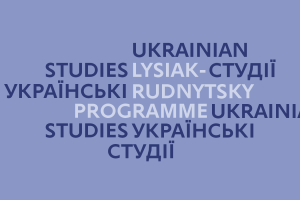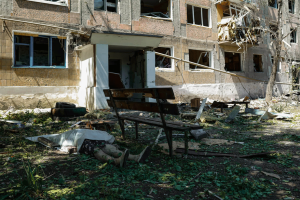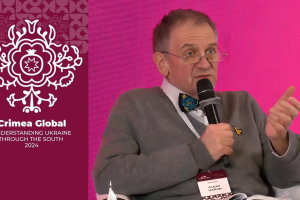National Exit Poll 2012: who is conducting it and how?
On October 28, 2012, the day of elections to the Verkhovna Rada of Ukraine, the National Exit Poll 2012 Consortium, which is made up of the Ilko Kucheriv Democratic Initiatives Foundation, the Kyiv International Institute of Sociology and the Razumkov Economic and Political Studies Center, will conduct the National Exit Poll 2012. The Democratic Initiatives Foundation will be responsible for the financial and media management of the exit poll. The Kyiv International Institute of Sociology and the Razumkov Center will conduct the polling of voters, while KIIS be responsible for management, developing the sample and coordinating the polling.
Sampling. The aggregate of the exit poll, meaning those who voted at election stations in Ukraine (with the exception of special polling stations). The sample will be representative for Ukraine on the whole and for its four regions (West, Center, East and South).
The sample is a two-degree cluster in the first stage in each oblast that is proportional to the number of voting stations in those oblasts, which are selected according to the level of probability. In the second stage a systematic (stage-by-stage) selection of voters is conducted at the voting stations. A constant selection will be conducted over the entire course of the day of elections.
The results of public opinion polls will be presented on the national scale divided into sections according to the four regions of the country:
Western region – Zakarpattia, Volyn, Rivne, Lviv, Ivano-Frankivsk, Ternopil, Chernivtsi and Khmelnytsk;
Central region – Zhytomyr, Vinnytsia, Kirovohrad, Cherkasy, Poltava, Sumy, Chernihiv, Kyiv and the city of Kyiv;
Southern region – Crimea, Odesa, Mykolayiv, Kherson, Zaporizhzhia and Dnipropetrovsk;
Eastern region – Kharkiv, Donetsk and Luhansk.
Number of voting stations – 300 (150 for every research company).
Sample size – 16,500 respondents (depending on the turnout)
Number of interviewers – 2-3 volunteers will work at every voting stations and a total of 700 interviewers will undergo special training.
Margin of error of the sample. The statistical margin of error of the sample taking into account how it is devised will not exceed 1.3%, though there are always systemic margins of error that hinge upon a number of factors. Based on the experience of previous exit polls conducted according to similar methodology, we presume that the margin of error will not be higher than 2.5% for the leading politicians and will be within 0.5–1% for other parties and blocs. During the snap elections in 2007 the maximum margin of error of sampling for all parties did not exceed 1.1%.
Method of selecting data and the surveyor.
The method of “secret voting” will be applied as it reduces the number of rejections and significantly increased the reliability of the exit poll data. The essence of the methodology is that when conducting opinion polls instead of giving the direct question “For whom will you vote?” the respondent fills out a questionnaire that starts with this question. Besides that, the questionnaire contains questions about sex, age group, education and when the respondents made their decision as to whom the y will vote for. Furthermore, the respondent will be asked to answer certain demographic questions, but will tell them that this is not compulsory.
Main objective of the project – to ensure effective civic control over the fairness of the electoral process and obtain information about the socio-demographic structure of the parties’ electorate.
In Ukraine the tradition of conducting exit polls initiated by the Democratic Initiatives Foundation, which was the first to organize an exit poll and the television program Election Night during the 1998 parliamentary elections, is well established.
Since then participants of the project gained extensive experience in organizing and conducting public opinion polls upon the exit of voters from voting stations. The Democratic Initiatives Foundation organized he exit poll during the parliamentary elections in 1998, 2002, 2006 and 2007, two rounds of the presidential elections in 1999, three rounds of the presidential elections in Ukraine in 2004 and two rounds of the presidential elections in 2010.
From 1999 the Kyiv International Institute of Sociology participated in all these exit polls and the Razumkov Center participated in them since 1994. This year the Democratic Initiatives Foundation will conduct its 12thexit poll, KIIS will conduct its 10th national exit poll and the Razumkov Center will conduct its 8th national exit poll. Several local exit polls were also conducted in the cities of Mukacheve and Kyiv.
Presentation of data. There are plans to make public the results of the voting results three times:
- first, immediately after the voting stations are closed on October 28 at 20:00 on the basis of data compiled two hours prior to the closure of the stations;
- second, 3 hours after the closing of the voting stations at 23:00 with additional data received by telephone;
- third, release of a detailed report 5-7 days after receiving voting ballots on paper.
Information will be synchronously made public in Ukrainian and English on the following websites: http://www. dif-exitpoll.org.ua, dif.org.ua and chesno.org. It will be disseminated through an electronic mail server and social networks.
In addition to that, the Ilko Kucheriv Democratic Initiatives Foundation plans to publish a book with the results of the exit poll after every election.
The National Exit Poll 2012 is financially supported by international donors: International Renaissance Foundation, the Matra Program of the Embassy of the Netherlands in Ukraine, the National Endowment for Democracy (U.S.), PACT, the UNITER project (Ukraine National Initiatives to Enhance Reforms) and the European Union.
Realization of the project will be controlled by an Oversight Council on which the heads of non-government organizations, top Ukrainian journalists and Ukrainian and foreign political analysts.








